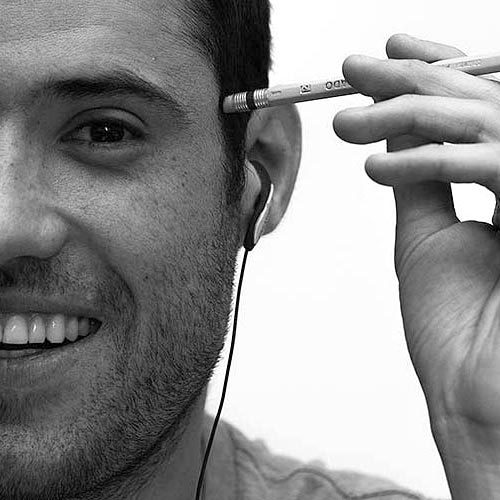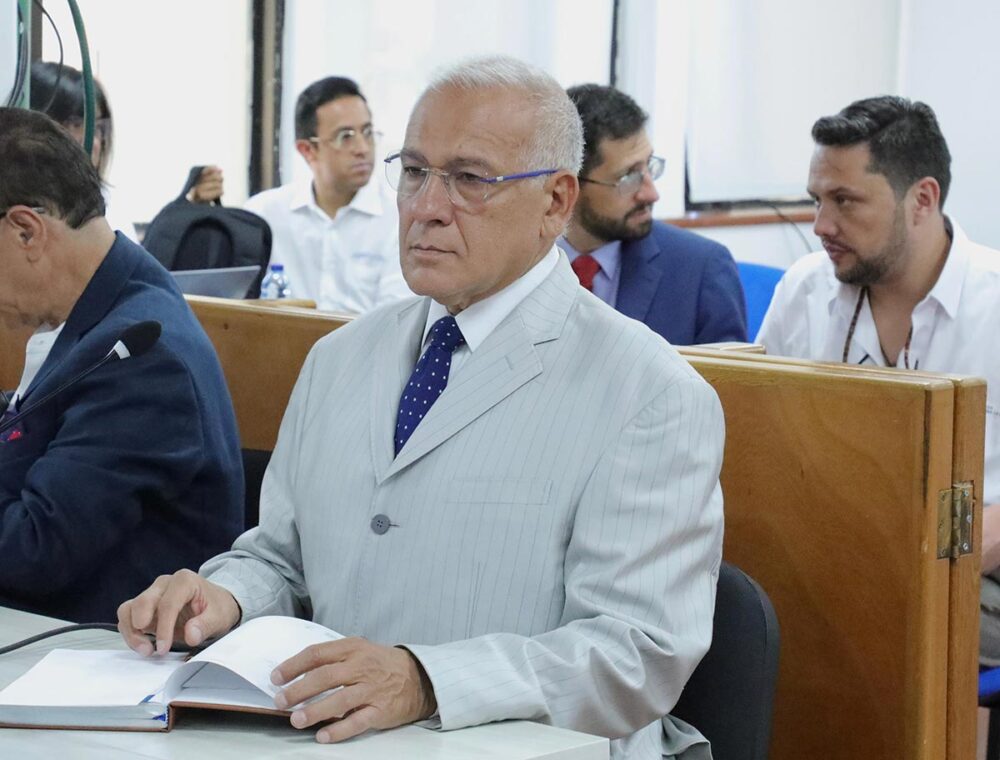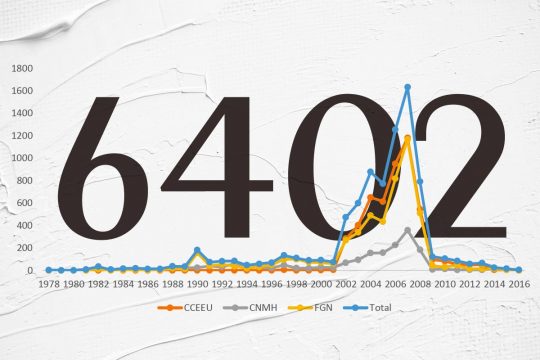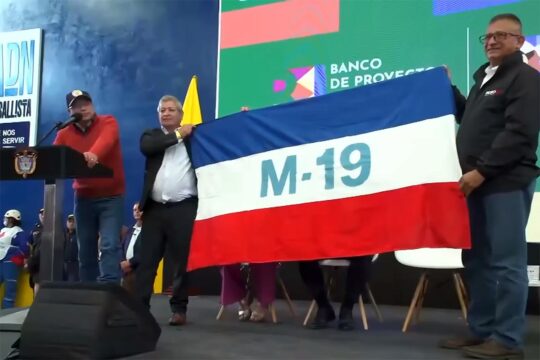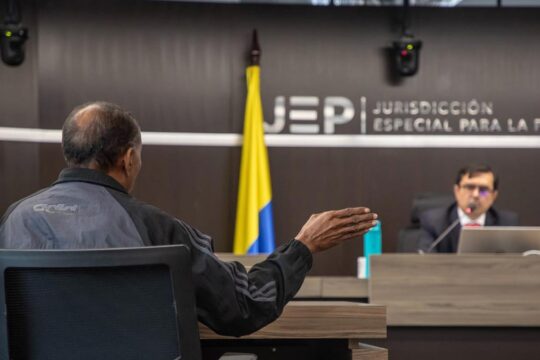For four hours on the afternoon of September 18th and one more the following morning, retired Colonel Hernán Mejía Gutiérrez sat silently not far from the man who, two decades ago, was his number two in the ‘La Popa’ No. 2 Artillery Battalion, in charge of security in a vast cattle-raising and coal mining area flanked by mountains in Colombia’s Caribbean region, near the Venezuelan border.
Heber Hernán Gómez Naranjo, also a retired colonel, recounted how Mejía pushed since early 2002 for soldiers and officers in the military unit he presided to present the bodies of a dozen unidentified persons as false combat kills. “My colonel, you talk a lot about honour. I don’t think it’s honourable to give orders to your subordinates and then turn your back on them and wash your hands,” he told him, the only moment that he addressed him directly.
The scene took place in a small courtroom in the scorching city of Valledupar. It was the opening of the first adversarial trial conducted by the Special Jurisdiction for Peace (JEP), the judicial arm of Colombia’s transitional justice system stemming from the 2016 peace deal with the former Revolutionary Armed Forces of Colombia (FARC) guerrilla. Mejía is accused of being involved in 72 extrajudicial executions between 2002 and 2003.
The two former high-ranking Colombian army officers have been charged with war crimes and crimes against humanity, but represent two opposites of the country’s transitional model. While Mejía chose not to acknowledge his role in the scandal known by the euphemism of ‘false positives’, his interlocutor was one of the 12 military from the La Popa battalion who accepted the JEP’s charges. But after admitting his role during a public hearing in Valledupar in 2022 and apologising to victims, Gómez Naranjo is set to receive a more lenient sanction than his former boss will receive if defeated in the trial running until later this year.
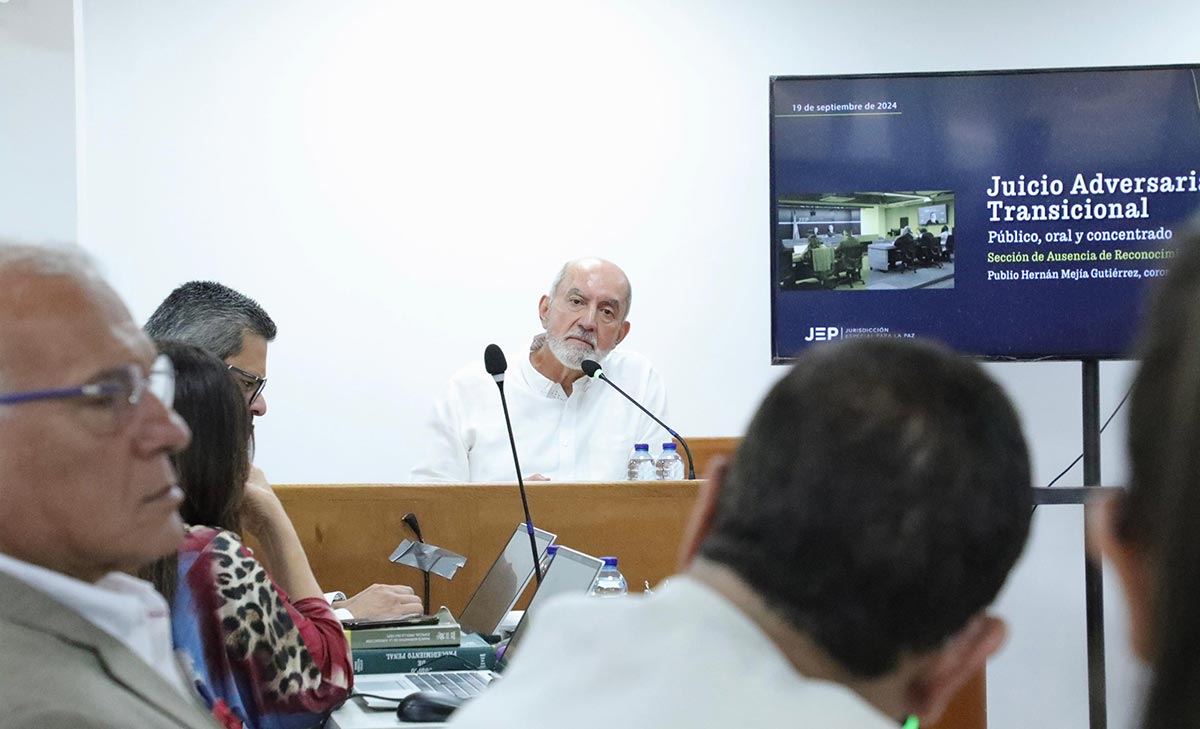
The JEP’s first adversarial trial
The JEP’s first adversarial trial has been very different from what Colombians have seen so far from the special tribunal. Instead of carefully choreographed public hearings in which former members of the military or FARC listened to the painful accounts of dozens of victims and admitted their participation in extrajudicial executions or kidnappings, the trial against Mejía has a staccato rhythm more typical of an ordinary criminal trial, with the fragmentary responses and small theatricalities of interrogations and cross-examinations.
It’s also not taking place in a large auditorium decorated with giant photos of victims and filled with their relatives. In the anodyne courtroom on the fifth floor of Valledupar’s tallest building, only ten victims silently follow the judicial proceedings, some of them wearing their relatives’ faces printed on T-shirts. Their voices are only heard when one of them takes the stand to testify, as when Alith Pacheco narrated how his brother Anuar de Armas was killed in February 2004 by paramilitaries of the United Self-Defence Forces of Colombia (AUC) and his body presented by the army as a National Liberation Army (ELN) rebel killed in combat. The windows reveal five overlapping layers of emerald green to greyish purple foothills, as the country’s highest mountain range, the Sierra Nevada de Santa Marta, rises.
But it’s not an ordinary criminal trial either. It wasn’t decided until a week before it would be public, as the defence and the JEP’s own prosecutor’s office requested that it be kept confidential. The three justices who will rule on it decided however that the transitional justice’s principle of publicity prevailed and ordered a live broadcast – which reached 19,700 views – except when there’s a security risk for a witness. It was also unclear whether victims’ lawyers would be able to intervene, something that the criminal justice system excludes but that the JEP has favoured. Mejía’s defence and the Inspector General’s Office opposed it, and after the justices’ decision allowing it, the defence appealed.
Mejía, emblematic figure of the “false positives”
During the trial’s first three days, Colonel Mejía remained unmoved, his hands forming a triangle on the table, or his arms folded. From time to time, he’d jot something in his notebook. The rest of the time his gaze remained fixed, inscrutable, on the witness stand to his left. He spoke only once. “Your Honour, as I have said and I reiterate, for the truth and the history that the JEP must reconstruct for this country, for the respect of victims and dignity of the institutions, I do not accept the charges brought against me. I cannot accept what I never did,” he said at the outset, dressed in a grey pinstripe suit and blue tie.
To most Colombians, Mejía has been one of the emblematic figures of the ‘false positives’. Considered one of the army’s most decorated officers and holder of five public order medals, Mejía was relieved of his post in January 2007 by Defence Minister Juan Manuel Santos, during the administration of Álvaro Uribe, in one of the first corrective measures before the scandal broke publicly. It was also the first time in history that a defence minister publicly acknowledged the links of a senior active military officer with paramilitaries.
His case was referred to the Attorney General’s Office following a whistle-blower complaint by one of his subordinates, in Santos’ words, over possible “links to paramilitarism, human rights violations, casualties that may not be the result of military operations, and acts of corruption”. Six years later, he was sentenced by the ordinary justice system to 19 years in prison for links to paramilitaries. Years later, the political faction led by Uribe started using his case to oppose peace negotiations with FARC, disseminating his thesis that he was the victim of an alleged plot hatched by then President Santos and his peace commissioner Sergio Jaramillo, or that the guerrillas had a ‘special secretariat’ that secretly controlled the state and even the church and large corporations.
The colonel who designed the criminal plan
Colonel Mejía is accused of “devising, designing and executing, through an illegal organised apparatus of power, a criminal plan that consisted of murdering civilians and presenting them as combat casualties, motivated by giving society a false perception of security and seeking to consolidate his image as the best officer in the National Army”, according to the indictment by the JEP’s Investigation and Accusation Unit. It is the body in charge of accusing those who – after previous investigations conducted by the tribunal’s Acknowledgement Chamber – refuse to admit their role, clarify the truth and redress victims.
According to prosecutor Samuel Serrano in Valledupar, there is “copious evidence” that Mejía was aware of and participated in 72 of the 75 extrajudicial executions attributed to the La Popa battalion during his command between January 2002 and November 2003. These crimes occurred, the prosecutor argued, in three modalities. Initially, the military banded together with paramilitaries, who targeted or killed people who would end up being presented as false combat kills, in what he described as a “mutually beneficial” alliance. They then went on to personally murder civilians. And in parallel, they executed combatants who’d surrendered or were hors de combat to inflate their casualty numbers.
Call for the harshest transitional justice sentence
“It was irrelevant whether Mejía was present or not in the place where events took place. Members of the illegal organised apparatus of power that he devised, created and now directed knew what tasks each of them had been entrusted with [and] once again the cycle of crime was activated,” the prosecutor said. One received from paramilitaries the location where they’d find false casualties and simulate a combat, another took them to the morgue in Valledupar and accompanied the officials who’d carry out the autopsy, another wrote the patrol report and the false operations order used to legalise the alleged combat, and all of them then coordinated the stories they’d tell the justice system. In prosecutor Serrano’s words, “the train was in motion: it was enough to get on it to commit these crimes”.
The battalion’s victims, the prosecutor explained, were young men and in some “condition of vulnerability”. Out of a total of 129 victims, 39 were farmers and 30 informal workers, a third never finished school and five were children. Thirteen were indigenous Kankuamos or Wiwas from the Sierra Nevada. “I’d like you to think about what has happened in your lives over the past 22 years: many finished studying, built a home, said goodbye to loved ones and welcomed others, saw or lived in new places. All of this was denied to 72 persons, as well as to their parents, siblings, children and wives”. Arguing that Mejía “was given multiple opportunities (...) to acknowledge responsibility” but “cast them aside”, he called for Colombia’s harshest transitional justice sentence of 20 years’ imprisonment.
“The murderous train was not created by my client”
On the other side, the defence characterised Mejía as an exemplary military official who “saved [Cesar department, whose capital city is Valledupar] from the plagues ravaging it” and received the battalion command at a turbulent time, three months after FARC kidnapped and murdered Consuelo Araújo, the godmother of Valledupar’s famous vallenato music festival and the country’s minister of culture until just six months before.
“This wasn’t a murderous train created by my client,” said defence lawyer Germán Navarrete, picking up on the prosecutor’s metaphor in a country that has no passenger rail transport. The defence didn’t deny that crimes were committed in the battalion, but sought to distance Colonel Mejía from them, insisting that he never gave an illegal order. “There were soldiers who killed and officers who promoted crimes within the battalion. We have them in the police and everywhere because of the great corrupting power of drug trafficking and criminality. But we cannot blame commanders for everything that some of their subordinates do,” he argued.
“That train of death was already there”
According to the defence, Mejía’s leadership conducted 500 successful military operations in two years and prosecuted soldiers who diverted weapons to the paramilitaries, “always adhering to military regulations in force at the time”. He had 2,000 soldiers under his command in “a battalion the size of a brigade”, meaning context, he argued, should not be considered sufficient evidence to convict him.
“Today we are prosecuting him for what some lieutenants and officers and a colonel did,” Navarrete said, referring to the 12 officers who, after being indicted alongside Mejía in July 2021, have accepted responsibility and are still awaiting their more leniente 5-to-8-year sentence in a non-prison setting. Two already testified against Mejia and eight others should do so at the remaining three hearings later this year. The defence lawyer portrayed them as “a gang of hired killers committed to paramilitaries and guerrillas who will now serve as witnesses” and with whom the prosecution “made a convenient alliance,” in which they receive favourable criminal treatments. “How strange that [Mejía] created a train of death and it only ever worked in Valledupar! That train was already there,” he closed.
The commander according to his subordinates
Among the first group of 63 witnesses requested by the prosecution, three served under Mejía in Valledupar and recounted several of the crimes in which they were directly involved.
First Colonel Gómez Naranjo recounted how Mejía instructed him to go at night with a group of soldiers to a rural road near Valledupar where he’d spot a bonfire. Right in front of the place, a car fled while firing shots into the air, after which they found a uniformed corpse in the bush, which they presented as a combat kill. “There was no combat, the dead man was already there,” he said, adding that he raised his concern to Mejía, who told him “not to worry, as he was a bandit”. Gómez Naranjo, who was a major at the time, said he received similar oral instructions from Mejía, picking up corpses without even firing a shot and legalising them as combat casualties. No one forced him, he underscored several times.
Lieutenant Nelson Llanos – who was detained for eight years but wasn’t deemed as most responsible for these crimes – then recounted how on another occasion he arrived at a designated spot in Patillal where four bodies were found. Gómez Naranjo ordered him to prepare the operations order detailing the ‘combat’ but, after the 21-year-old refused, sent him to talk to Mejía. “There are always things in life that you remember very well,” he said, his hand clutching a golden rosary. According to his account, the colonel told him, “they were bandits and had to die, ok?” He obeyed because, in his words, “when the battalion commander speaks to you in those terms, you can’t even utter a word”.
A more cryptic account was given by Manuel Valentín Padilla, who was often seen in the battalion dressed as a civilian but in fact was – unbeknownst to others – a sergeant in counter-intelligence duties. Padilla narrated how, hidden behind his alias ‘Hugo’ and his disguise as a banana seller in the public market, he became the human courier between the paramilitaries and Mejía, reporting directly to him messages detailing where they’d find bodies of new casualties. For this role he was indicted by the JEP and accepted the charges.
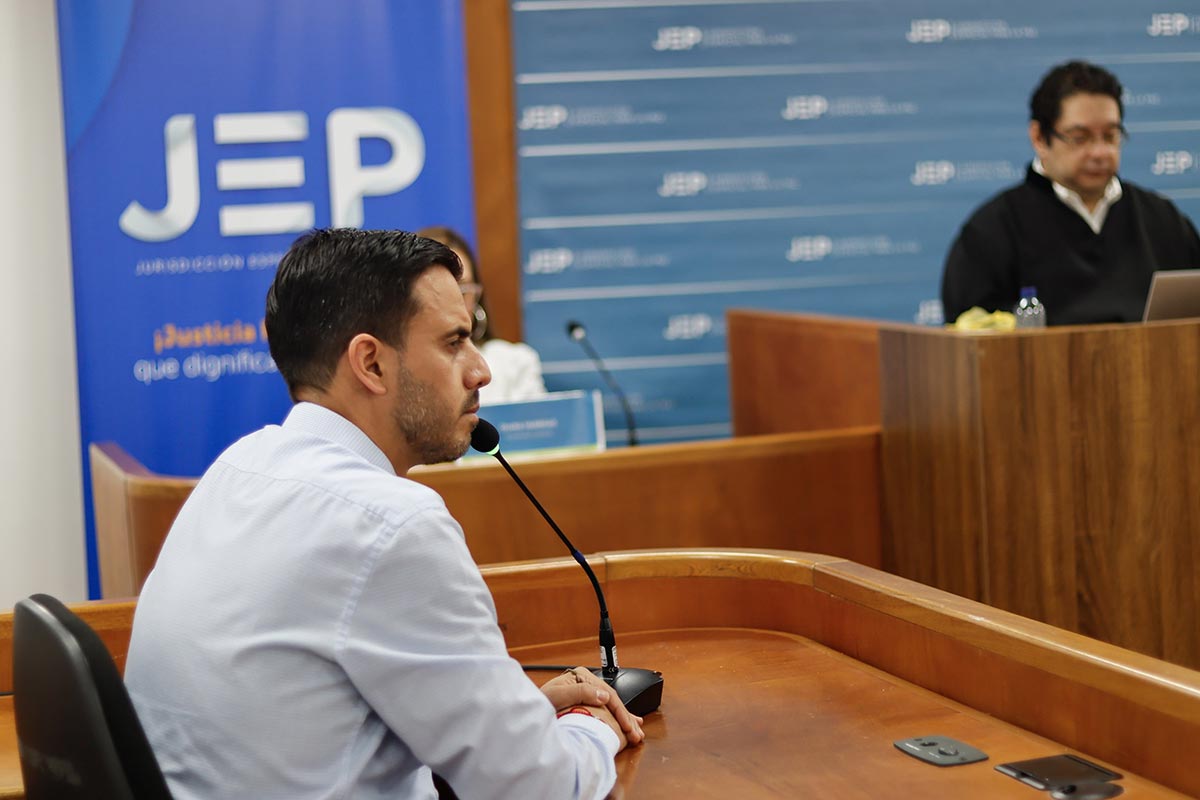
“My image of the honourable officer was shattered”
The names of their victims were surprisingly absent from their testimonies. Asked if he’d ever known them, Colonel Gómez Naranjo replied “never”.
On the contrary, their emotion was visible when they recounted the moment they decided to break with their former boss. For Gómez Naranjo, it happened when, while both were detained, he’d asked about several innocent indicted soldiers and, according to his account, Mejía told him not to worry about them. “That’s when I saw that the leader we’d defended for so long wasn’t who we thought he was. My image of the honourable officer who was close to his troops was shattered,” he said.
Lieutenant Llanos, who described Mejía with awe as “the person we all wanted to become one day”, said that his turning point came when, having been deprived of his liberty for four years, he heard him say that “there’s nothing in those [criminal] cases”. At that moment Llanos replied, according to his account, that “after reading the case files and realising what we did, he couldn’t go on manipulating me.”
Politicians who defended him are now silent
Besides the indictment, another significant change occurred during the six years of the JEP’s investigations. Despite his combative attitude, Mejía doesn’t seem to enjoy today the ascendancy and magnetism of the past, when the political sector most critical of peace negotiations with FARC lauded him as a “victim of infamy” and a “great hero”.
Many politicians who fiercely defended him a decade ago are now silent. Former president Uribe, who spread the thesis of an alleged conspiracy against him, last tweeted about him in 2018, the year Mejía flirted with being a presidential candidate. It is not yet clear whether Uribe will testify on Mejía’s behalf as requested by his defence.
Uribe’s party, the Democratic Centre, has similarly not spoken about him since 2016. Several of its most visible senators, like Paola Holguín and Paloma Valencia, also ceased defending him around that time. Only María Fernanda Cabal, currently a presidential pre-candidate and part of the party’s far right, has continued doing so, even from the courtroom.
“My rest will come when he says my son was not a rebel”
For the dozen victims who attended the trial, seeing Mejía on the stand was difficult - especially at moments like the first lunch break when they all coincided on the lift landing - but satisfying.
“I feel a sense of calm because the truth is emerging about what he was not,” says Carmen Ruidíaz, referring to her son Jaider Valderrama who was murdered on 22 March 2003 and presented as a paramilitary. It was also comforting for victims, like Mara Nieto, who weren’t part of the trial. Her brother José Luis disappeared in 2003 on his way to the Valledupar bus terminal where he sold coffee and was found murdered five years later. “It’s like when you’re very sick, you’ve been to all kinds of doctors and suddenly one calls you to announce that you have cancer but that it’s at a stage where something can be done. That’s what I felt,” she says.
A similar sentiment was expressed by Armando Pumarejo, whose son Carlos Alberto was killed inside the battalion on 22 June 2002 and presented in the media as a FARC militiaman. He attended the three days of the trial, jotting down on his notebook. He was accompanied by his daughter-in-law Gelka Hinojosa, who was one month pregnant with twins when she lost her husband and had to use her holidays to attend the trial.
“My rest will come when this man, having tarnished Carlos Alberto’s good name, says my son was not a rebel”, Pumarejo says. “Or at least that the transitional justice system says so”.

